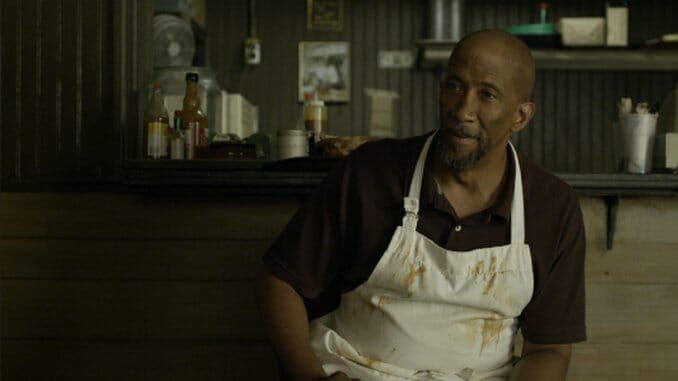
While Frank Underwood is a self-serving moral vacuum, an entity in search of more power at all costs, Raymond Tusk is almost as malevolent in his role as representative of the one percent. Make no mistake about it: all of the politicians featured in House of Cards are extremely wealthy, but Tusk is depicted as the type of uber-wealthy that has developed in this country particularly since the 1980s, and he acts as a mirror for Frank’s aims. Where Frank wishes to accumulate as much power as possible, Tusk wishes to accumulate more money. In both cases, there’s no real end, no goal, besides the accumulation itself, but that addiction to growth, that need for both parties to balloon to even greater size, keeps them in competition with each other.
Until “Chapter 20,” however, Tusk’s money was mostly abstract. He was wealthy because the show said he was, but we hadn’t seen much actual demonstration of what could be done with more than $40 billion in the wrong hands. Finally that money has come into play, as attack ads appear funded by his cash that jeopardize the Democrats during their midterm election. Of course, the fact that Tusk should have so much influence on the election is fundamentally un-democratic and un-American, and we’re supposed to be disgusted by this. However, moreso than so many other elements of House of Cards, it’s darkly realistic. The concept of “buying” elections may sound like it can only exist elsewhere, but that’s certainly far from the case, and this is how Tusk can really flex his muscles.
“Chapter 20” revolves around this hunt for this campaign money—or rather a way of stopping it. This search leads Stamper to China, speaking with Feng about his dealing with Tusk and what it would take to stop them, as well as to the donor himself, a Native American casino owner named Daniel Lanagin through whom Tusk has been laundering his election money. These negotiations are interesting mostly in contrast to the usual politicking on the show. Frank is especially good at getting people to do what he wants (he was an extraordinary whip), but both Feng and Lanagin are essentially beyond his reach. Lanagin in particular puts it bluntly: Tusk is paying him more, so unless Frank can better that, he’s out of luck. Frank has been winning his competition against Tusk because they’ve been played on his battlefield, that of sheer power, but when it comes to dollars Frank isn’t even a competitor.
The actual visit between the Walkers and the Underwoods was fine enough, mostly because Frank and Claire are always entertaining when they need to act as a real couple. Their dynamic never becomes dull, especially when they’re playing people (which is most of the time) as they are here. It’s noteworthy that none of these characters seem to have any real friendships—power and loneliness come together, Frank tells the president, but that seems to be the case only because the accumulation of power within this system is so corrupt.
The press secretary situation finally developed, and now we learn that Grayson had been working for Tusk and Remy. He claims to be turning on them now, though, and despite his sociopathic demeanor and lack of loyalty, this seems to be the case. Grayson is certain to become a valuable tool to the Underwoods before the end of the season; it’s just a question of where his loyalties really lie, if anywhere. After all, who in House of Cards’s universe is really working for anyone but himself?
As in other episodes that are largely about moving the story forward, there were also quite a few other little bits we saw glimpses of, including Jackie’s betrayal of the Underwoods, the continued friction between the Walkers as a result of Claire’s (still seemingly unmotivated) meddling and my favorite, the rise in popularity of Freddy’s barbecue. Hopefully things will continue going well for him, though given House of Cards’ proclivities, that’s unfortunately not likely to be the case.
“Chapter 20” really was an episode focused on moving the story forward and deepening our understanding of characters, so it wasn’t a big episode, but it also didn’t feel like it was spinning its wheels. This 50 minutes moved swiftly, without filler, and for once the political issues weren’t obtuse—money’s not too difficult to understand or depict. The show’s trademark set pieces were largely missing, but it felt good to get out of the mire of endlessly passing bills through Congress and into new, less abstract stakes.